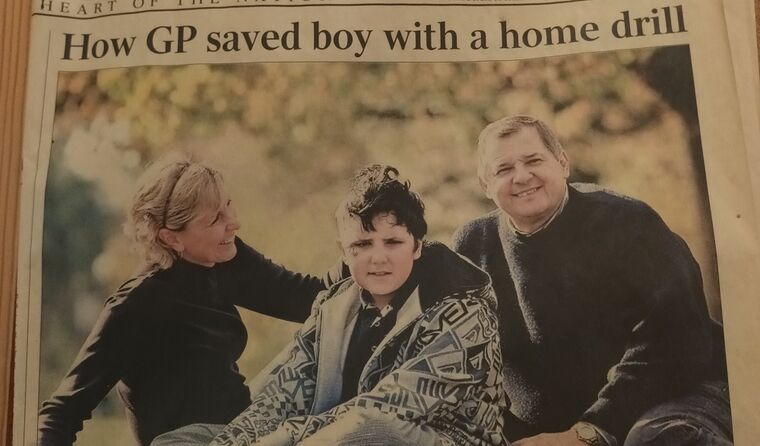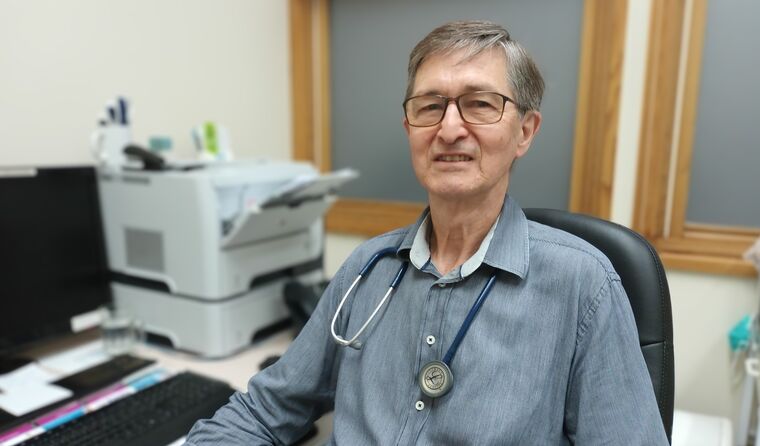Feature
The GP who inspired the RACGP President
A mentor to Dr Nicole Higgins, this doctor has been part of the fabric of his Victorian country town for more than 40 years.
 Dr David Tynan and Dr Nicole Higgins in the reception of the Nightingale Clinic in Maryborough. (Image: Jolyon Attwooll)
Dr David Tynan and Dr Nicole Higgins in the reception of the Nightingale Clinic in Maryborough. (Image: Jolyon Attwooll)
It is easy to imagine how Dr David Tynan would be a reassuring presence when his patients need it most.
A GP and anaesthetist in Maryborough – a country town in the Victorian Goldfields – for 43 years, he is a slight man with a gentle manner who has shared more of the fraught moments that punctuate community life than he can recall.
He has delivered generations of babies, palliative care for beloved family elders and treatment for everything in between: weekend sporting mishaps, life-threatening emergencies, and the slow-burning craft of helping those with long-term chronic disease.
Most of his care goes largely unremarked, apart from by the people to whom it matters most. One incident, however, made news around the world.
A headline shouts from a newspaper clipping still pinned to a staff noticeboard in the Nightingale Clinic, where Dr Tynan has worked for almost half of his time in the town: ‘How GP saved boy with a home drill’.
That GP was Dr Tynan’s former practice partner, Dr Rob Carson, who one Friday evening in May 2009 was treating an unconscious 12-year-old boy injured in a bike accident.
With David Wallace, a neurologist in Melbourne, on the phone providing advice, and Dr Tynan summoned to anaesthetise, Dr Carson fetched a drill from the boiler house, sterilised a 9mm drill bit, and inserted burr holes into the child’s skull to relieve pressure on his brain.
A helicopter then transported their patient to the Royal Children’s Hospital, leaving the doctors to wonder if their efforts had been a success.
‘We didn’t have a CAT scan in town, we made a clinical diagnosis,’ Dr Tynan told newsGP. ‘The next morning, when I heard that he had survived it all, it was just an amazing feeling.’

The story that made front page news across the country. (Image: Jolyon Attwooll)
Dr Tynan does not seem like a man who loves the limelight, and his recollection of that episode reflects both that and the real motivation fuelling his long career.
‘[The media attention] took over a bit,’ he said. ‘It was more a personal sense of achievement, especially for this kid who I’ve delivered, then looked after, and looked after his mum as well.
‘That was the really special thing.’
That connection to his patients is a constant, powerful theme as he reflects on his career, but Dr Tynan acknowledges it was almost quite different.
At least twice in fact, he could have been lost to general practice. While he was on a two-year placement in England, a consultant attempted to convince him to do obstetrics full-time.
And then he was almost lured by the siren call of emergency medicine.
‘I really enjoyed emergency and probably if I had come through once it became a specialty as it is now, I would have been tempted,’ he said.
‘I’m so pleased that I didn’t.
‘The lack of continuity of care, knowing what happens to patients – you treat the urgent things, and then you lose track of where they are and what happens to them.
‘I think that’s really sad.’
Among the families that Dr Tynan has treated over many years is that of Dr Nicole Higgins, now the RACGP President, who moved to Maryborough at the age of 11.
She credits Drs Tynan and Carson for inspiring her love of general practice, and has spoken previously of the formative time spent in their practice alongside a sister and brother living with disabilities.
‘David has become part of the fabric of my whole family for generations. Not just David, but the people who are around him,’ Dr Higgins told newsGP.
‘It’s actually modelling what general practice could be.’
Dr Tynan is also keen to pay tribute to his colleagues.
‘I am really proud of this practice,’ he said.
‘The reception staff are amazing, the way they triage things, they know the people so well, they go the extra mile.
‘The only complaint I’ve had about my staff is that the office is too noisy because they laugh too much.’
Earlier this month, the day after the funeral of her grandmother – another of Dr Tynan’s patients – Dr Higgins dropped into her old mentor’s clinic, finding time to reminisce about her childhood sporting injuries and misadventures.
‘When I had dislocated my shoulder during netball, you relocated it. I fell down the stairs and broke my wrist – it was Rob Carson who plastered that one,’ she told him.
‘Things that you might not remember but I did. For me, that was something I wanted to do when I grew up.’
Dr Tynan in turn recalls Dr Higgins on placement more than 25 years ago, and being excited that, as a local, she was more likely to return to the clinic permanently.
And while she settled more than 2200 km north in Mackay instead, Dr Tynan still remains deeply invested in the value of bringing young medics into the clinic to get a true sense of a GP’s work – even if they choose not to pursue general practice as a career.
‘They certainly have a lot more respect for it, because often the hospitals and the consultants make derogatory remarks about general practice,’ he said.
 Dr David Tynan is due to retire next year after more than four decades in general practice. (Image: Jolyon Attwooll)
Dr David Tynan is due to retire next year after more than four decades in general practice. (Image: Jolyon Attwooll)
Although no follower of GP politics, he was aware of his former protégé’s election last year.
Recently, staff at the clinic shared a speech which the RACGP President made at the Primary Care Conference, when she name-checked him to attendees in Canberra.
‘I guess it does make you feel good, that you’ve been recognised for the contribution that you’re making and so forth,’ Dr Tynan said. ‘It is weird, but it is satisfying as well.’
While the red tape of his profession is a serious bugbear, and he is unsure about MyMedicare (‘talk to you about that later,’ he says to Dr Higgins), he remains passionate about the path he chose.
‘It is a great career because of its flexibility, especially these days,’ he said. ‘You can be part time, you can have special interest areas in things like anaesthetics, obstetrics, and urgent care in rural practice.
‘In more urban practice, you’ve got things like palliative care, or women’s health or skin cancer medicine, you can do a whole lot of other things.
‘But it is the continuity of care that’s always been the biggest drawcard for me – the fact that you can manage a family through the whole lifecycle.
‘That’s been the most important, satisfying thing as far as I’m concerned.’
Now 70, Dr Tynan has made the call to stow away his stethoscope early next year, leaving the clinic and the hospital anaesthetic work to the next generation.
‘It’s going to be a challenge, because it’s been who I am for a long, long time,’ he said.
However, there is no doubt his legacy will live on for Dr Higgins and the many others he has taken under his wing.
‘That willingness to invest time, you might not have known how important that was,’ she told him.
‘I was probably really annoying, but I wanted to learn, and those early influences are just so important.’
Log in below to join the conversation.
general practice mentorship rural medicine
newsGP weekly poll
As a GP, do you use any resources or visit a healthcare professional to support your own mental health and wellbeing?